The Stoics
Stoicism, an ancient Greek philosophy founded in the early 3rd century BCE, has profoundly influenced both ancient and modern thought. It emphasises virtue, wisdom, and the development of self-control and fortitude as a means to overcome destructive emotions. Zeno of Citium established the philosophy in Athens and has been perpetuated through the writings and teachings of various notable figures, including Marcus Aurelius, Seneca, Epictetus, and Musonius Rufus. Here we will explore the key figures in Stoicism, their significant contributions, the major historical events during their times, and a timeline of the major contributors to Stoicism from its inception to the present day.
Zeno of Citium (c. 334–262 BCE)
Life and Major Events:
Zeno of Citium, the founder of Stoicism, was born in the bustling port city of Citium (modern-day Larnaca, Cyprus), a place heavily influenced by both Greek and Phoenician cultures.
Zeno initially led a prosperous life as a wealthy merchant, trading purple dye and other valuable goods. However, his life took a transformative turn when he survived a shipwreck that left him stranded in Athens around 300 BCE. This event marked the end of his mercantile career and the beginning of his philosophical quest. He was reportedly drawn to a bookstore in Athens, where he read about Socrates and asked the bookseller where men like Socrates could be found. The bookseller pointed to Crates of Thebes, a famous Cynic philosopher, who became Zeno’s mentor. Under Crates and other philosophical figures of the time, including Stilpo and Xenocrates, Zeno began formulating his own philosophy, which blended the ethical teachings of the Cynics with ideas from the broader Socratic tradition.
Zeno gained a reputation for his ascetic lifestyle and taught his philosophy at the Stoa Poikile, a colonnade in Athens, giving rise to the term Stoicism. His teachings attracted many followers, and over time, Stoicism would become one of the most influential schools of thought in the Greco-Roman world.
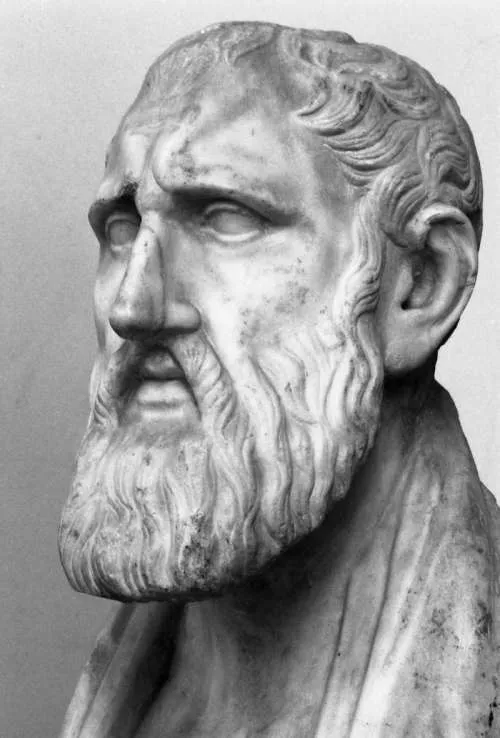
Notable Writings:
Zeno’s primary contributions to Stoicism include several works, though none have survived in their original form. His key writings included:
- The Republic: This work outlined Zeno’s vision of an ideal society governed entirely by reason. It rejected traditional institutions like slavery and emphasised the importance of equality and communal living. Zeno’s version of a republic was significantly influenced by Plato but focused more on practical, ethical governance.
- Ethics: In this foundational text, Zeno laid the groundwork for Stoic moral theory, teaching that virtue is the only true good and that happiness comes from living in harmony with nature and reason.
Although Zeno’s original works were lost over time, his ideas were preserved and elaborated upon by later Stoics like Chrysippus and Cleanthes and eventually Roman philosophers such as Seneca, Epictetus, and Marcus Aurelius. His influence shaped Stoicism into a resilient philosophical system focused on ethics, self-control, and understanding the natural world.
Interesting Facts:
Zeno was known for his frugality and self-discipline. He lived a simple life, wearing thin cloaks regardless of the weather, and ate sparingly. His Stoic teachings emphasised living in accordance with nature, focusing on what one can control and accepting with equanimity what one cannot. Despite being invited to a lavish court position by the King of Macedonia, Zeno declined, preferring the life of a philosopher in Athens. His students were so devoted that when Zeno died at the age of 72, Athens honoured him with a public burial and a monument, an uncommon gesture for foreign-born teachers.
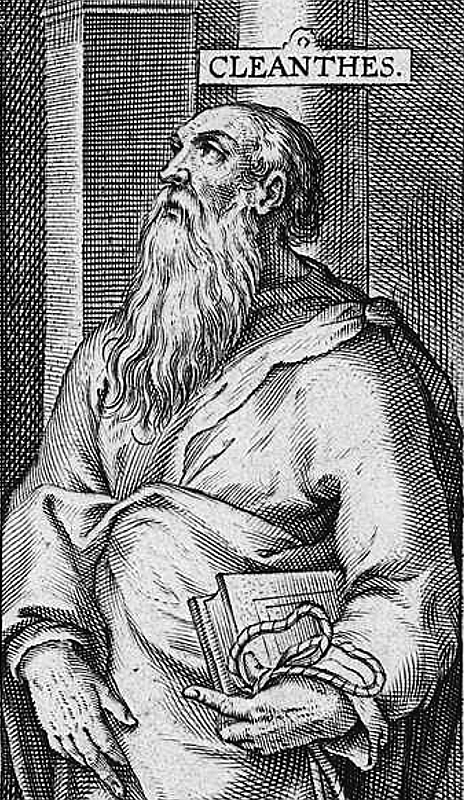
Cleanthes (c. 330–230 BCE)
Life and Major Events:
Cleanthes, who succeeded Zeno of Citium as the head of the Stoic school, was born in Assos in Asia Minor (modern-day Turkey). Before turning to philosophy, Cleanthes led a rather unorthodox life for a future philosopher—he was initially a boxer. This background in physical discipline may have contributed to his later dedication to the rigours of Stoic thought. Upon arriving in Athens, Cleanthes began studying philosophy under Zeno. Despite his intellectual aspirations, Cleanthes was impoverished and often had to work manual labour at night, drawing water from wells to support himself, earning the nickname “the Well-drawer.” His dedication and perseverance impressed his contemporaries, especially Zeno, who entrusted Cleanthes with the leadership of the Stoic school after his death.
Although Cleanthes was known for his slower intellect compared to other Stoics, his immense patience, diligence, and strong moral character allowed him to make significant contributions to Stoicism. He played a crucial role in preserving and expanding Zeno’s teachings, particularly in the areas of ethics and Stoic cosmology.
Notable Writings:
Cleanthes’ influence on Stoicism can be seen through his key writings, though only fragments survive today. His notable works include:
- Hymn to Zeus: This is perhaps Cleanthes’ most famous surviving work. It is a poetic expression of Stoic theology, praising Zeus as the rational force governing the universe. The hymn encapsulates the Stoic belief in a cosmos ordered by divine reason, where all events occur in accordance with a universal law.
- On Pleasure: In this treatise, Cleanthes contrasts Stoic views with the hedonistic philosophies of Epicureanism. While Epicureans argued that pleasure was the highest good, Cleanthes defended the Stoic position that virtue, not pleasure, leads to true happiness and flourishing.
Cleanthes’ writings served as an important bridge between the early teachings of Zeno and the later developments under Chrysippus, his successor. His poetic and philosophical reflections laid the groundwork for the Stoic understanding of the interconnectedness of the universe, human reason, and moral virtue.
Interesting Facts:
Cleanthes was admired for his remarkable persistence and moral strength, even in the face of poverty. Despite his austere circumstances, he once saved enough money from his well-drawing job to make an offering to the goddess Demeter, an act that symbolised his piety and commitment to living virtuously. His perseverance earned him a position of respect in the Stoic school, and he famously defended Zeno’s teachings against critics. Cleanthes lived well into old age, dying at around 100. It is said he starved himself to death upon a physician’s advice after being struck by an illness, doing so calmly and rationally in the Stoic tradition of accepting fate with equanimity.
Chrysippus (c. 280–206 BCE)
Life and Major Events:
Chrysippus of Soli was a central figure in the development of Stoicism, often regarded as the second founder of the school after Zeno of Citium. Born in Soli, a city in Cilicia (modern-day Turkey), Chrysippus was highly educated and began studying philosophy early in life. He succeeded Zeno as the head of the Stoic school and played a crucial role in shaping its doctrines, systematising and expanding upon earlier Stoic ideas.
Chrysippus was known for his prolific output, reportedly authoring over 750 works, though only fragments survive today. His contributions helped to solidify Stoicism as a major philosophical school in the Hellenistic period. He also engaged in debates with other philosophical schools, notably the Academics and the Epicureans, advocating for the Stoic view of ethics, logic, and physics.
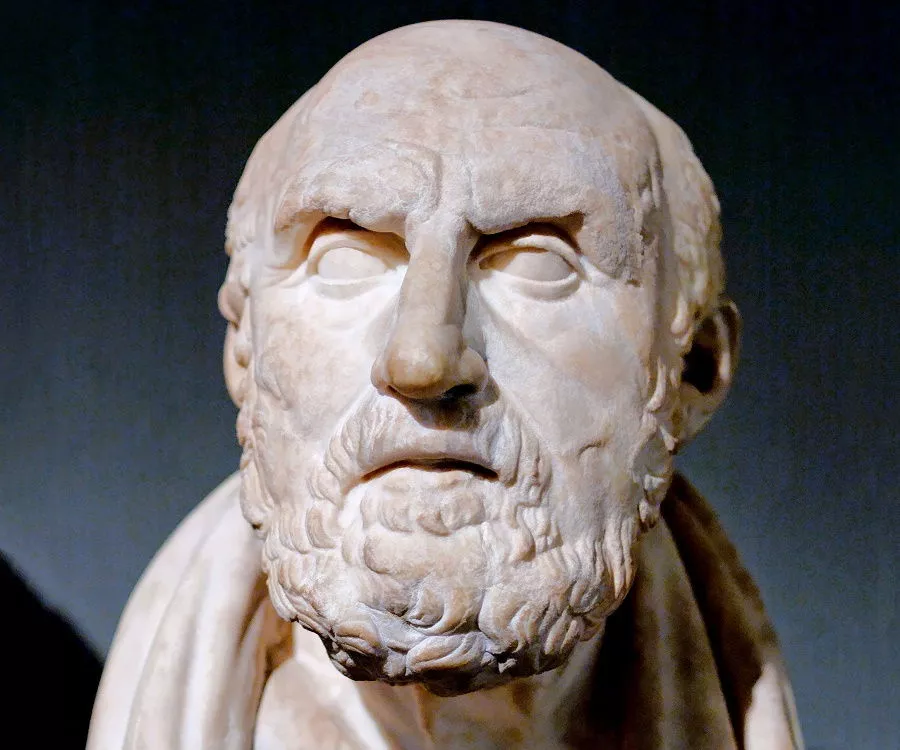
Notable Writings:
While the majority of Chrysippus’ writings have been lost, his influence persists through references in later texts and fragments. Key works attributed to him include:
-
On Providence: In this treatise, Chrysippus discusses the Stoic belief in a rational and ordered universe governed by divine reason (logos). He addresses the problem of evil and suffering, asserting that these are part of a greater divine plan.
-
On the Passions: This work outlines Chrysippus’ views on emotions, arguing that true virtue lies in managing one’s passions in accordance with reason. He classified emotions into rational and irrational categories, providing a framework for understanding human psychology from a Stoic perspective.
Chrysippus’ teachings were instrumental in establishing Stoic ethics and logic, influencing not only his contemporaries but also later Stoic philosophers.
Interesting Facts:
Chrysippus was renowned for his wit and intellectual prowess, earning a reputation as a formidable debater. He famously quipped that he could out-argue anyone, which reflects his confidence in the Stoic philosophy he espoused. His contributions to logic were particularly significant; he developed formal logic systems that laid the groundwork for future philosophical inquiry.
Despite the loss of most of his writings, his ideas were preserved through the works of later Stoics, such as Seneca, Epictetus, and Marcus Aurelius. Chrysippus’ influence extended beyond philosophy, impacting early Christian thought and later philosophical movements. He is remembered as a pivotal figure in Stoicism, whose systematic approach and integration of various philosophical ideas helped to shape the course of Western philosophy.
Roman Stoicism: From Greece to Rome
As Stoicism evolved, it found fertile ground in Rome, where it significantly influenced Roman thought and governance.
Seneca (c. 4 BCE–65 CE)
Life and Major Events:
Lucius Annaeus Seneca, commonly known as Seneca the Younger, was a Roman statesman, dramatist, and one of the most prominent Stoic philosophers of his time. Born in Corduba (modern-day Córdoba, Spain), Seneca was raised in a wealthy Roman family and received a rigorous education in Rome, where he studied rhetoric and philosophy. His early life was marked by illness, but he overcame these challenges to rise to prominence in both politics and literature. Seneca became a senator and served as an advisor to the notorious Emperor Nero, a role that afforded him significant influence but also exposed him to great danger. His relationship with Nero was complex; while he sought to instill Stoic virtues in the young emperor, Nero’s increasing tyranny cast a shadow over Seneca’s later years.
Seneca was eventually implicated in a conspiracy to assassinate Nero, known as the Pisonian Conspiracy, though the extent of his involvement remains debated. Ordered to take his own life, Seneca faced death with the calm dignity expected of a Stoic philosopher, choosing to end his life by slitting his wrists in 65 CE. His writings, blending Stoic philosophy with practical advice for daily living, remain influential and accessible, having resonated with readers for centuries.
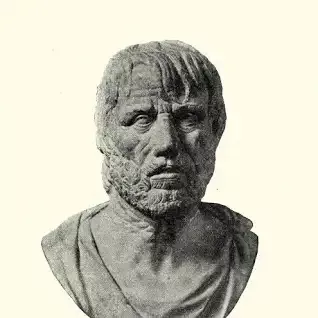
Notable Writings:
Seneca’s literary output is vast, encompassing essays, letters, and plays. His works stand out for their clarity and practical application of Stoicism, focusing on moral guidance and self-improvement. His notable writings include:
- Letters to Lucilius: A collection of 124 letters addressed to his friend Lucilius, these letters offer Seneca’s reflections on Stoic philosophy, providing practical advice on how to live virtuously, manage emotions, and confront life’s challenges. They remain some of the most accessible Stoic writings.
- On the Shortness of Life: In this essay, Seneca urges readers to value their time, arguing that much of life is wasted on trivial pursuits. He emphasises that a life lived virtuously is never truly short and encourages people to focus on what truly matters.
- On Anger: A powerful exploration of the destructive force of anger, this work discusses the Stoic approach to controlling this harmful emotion and offers practical techniques to cultivate calm and reason in the face of provocation.
Seneca’s ability to make Stoic philosophy relevant to everyday life has ensured his enduring popularity. His works tackle timeless human issues—time management, emotional control, and the pursuit of wisdom—with an emphasis on personal growth and self-discipline.
Interesting Facts:
Seneca’s life was marked by contradictions. Despite advocating for Stoic moderation, he amassed great wealth during his time in Nero’s court, leading some to accuse him of hypocrisy. Nonetheless, Seneca sought to use his influence for good, at one point even attempting to retire from political life to focus on philosophical pursuits. His moral philosophy had a profound impact on later thinkers, including early Christian writers who admired his Stoic teachings on ethics and self-restraint. His plays, particularly Thyestes and Phaedra, are considered masterpieces of Roman tragedy and reflect his philosophical concerns with fate, guilt, and human suffering. Seneca’s calm acceptance of death cemented his legacy as a true Stoic, living—and dying—according to the principles he espoused.
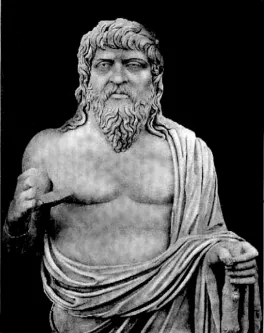
Musonius Rufus (c. 30–100 CE)
Life and Major Events:
Musonius Rufus was a prominent Roman Stoic philosopher, renowned for his practical approach to Stoicism and his emphasis on ethical living. Born into a wealthy family, he received a comprehensive education in philosophy, including the teachings of the Stoics. Musonius was known for his commitment to social justice and was an advocate for women’s education and equality, which was quite progressive for his time. His philosophical career was marked by periods of exile, as he often fell afoul of the political authorities due to his outspoken views on morality and virtue.
Musonius’ teachings were deeply influenced by the Stoic principle of living in accordance with nature and reason. He served as a teacher and mentor to several notable figures, including Epictetus, who would go on to record and disseminate his ideas. Musonius believed that philosophy should not merely be theoretical but should translate into practical guidance for daily life.
Notable Writings:
While Musonius Rufus did not write extensively, his ideas have been preserved through the writings of later philosophers, particularly in the following works:
-
Lectures: A collection of his lectures and teachings that cover a range of topics, including ethics, the nature of happiness, and the role of philosophy in achieving a virtuous life. These lectures provide insights into Musonius’ belief that philosophy should inform everyday actions and decisions.
-
On the Duty of the Philosopher: In this treatise, Musonius argues that a true philosopher must act with virtue and integrity, advocating for a life aligned with Stoic principles. He stresses the importance of applying philosophical concepts to real-world situations, emphasising that theory without practice is insufficient.
Musonius Rufus’ teachings highlight the Stoic ideals of self-discipline, moral courage, and the pursuit of wisdom as the foundation for a fulfilling life.
Interesting Facts:
Musonius was known for his simple lifestyle, often eschewing material comforts to exemplify Stoic ideals of moderation and self-control. He believed that true wealth comes from virtue, not possessions. His views on gender equality were particularly notable; he argued that women should have the same educational opportunities as men, advocating for their participation in philosophical discourse.
Despite the challenges he faced during his lifetime, including exile and opposition from powerful figures, Musonius remained steadfast in his beliefs. His legacy has continued to inspire modern interpretations of Stoicism, particularly regarding the application of philosophical teachings to contemporary ethical issues. Musonius Rufus is remembered as a pivotal figure in the Stoic tradition, embodying the principles of wisdom and integrity in both thought and action.
Epictetus (c. 50–135 CE)
Life and Major Events:
Epictetus was born a slave in Phrygia (modern-day Turkey) and faced significant hardships during his early life. After being freed, he pursued education in Stoicism under the renowned philosopher Musonius Rufus, who profoundly influenced his understanding of the philosophy. Epictetus initially taught in Rome, where his teachings gained popularity among students eager to learn about Stoic thought. However, his rise was interrupted when Emperor Domitian banished all philosophers from the city, prompting Epictetus to relocate to Nicopolis in Greece. There, he established a flourishing school, continuing to teach and shape the minds of many who sought wisdom and guidance.
Epictetus’ life experiences as a former slave informed his philosophy, which emphasised the power of the individual to control their responses and attitudes, regardless of external circumstances. His teachings advocated for resilience, inner strength, and the pursuit of virtue as the path to true freedom.

Notable Writings:
Although Epictetus did not write any texts himself, his teachings were meticulously recorded by his student Arrian in two key works that remain central to Stoic philosophy:
-
Discourses: This collection comprises a series of lectures delivered by Epictetus, exploring various themes of Stoic thought, including ethics, the nature of human freedom, and the importance of rational thinking. The Discourses offer rich insights into the practical application of Stoicism in daily life and serve as a testament to Epictetus’ engaging teaching style.
-
Enchiridion (Handbook): This concise manual serves as an introduction to Stoic ethics, distilling Epictetus’ core principles into practical advice. It emphasises the critical distinction between what is within our control—our thoughts and actions—and what is not, such as external events and the opinions of others. The Enchiridion has remained a popular guide for those seeking to apply Stoic philosophy to everyday challenges.
Epictetus’ teachings highlight the importance of personal responsibility, the cultivation of virtue, and the acceptance of life’s uncontrollable aspects, making them timeless and relevant across generations.
Interesting Facts:
Epictetus’ philosophy resonated deeply with later thinkers, including the Roman Emperor Marcus Aurelius, who often referenced his ideas in Meditations. Despite the adversity he faced as a slave, Epictetus exemplified the Stoic ideal of endurance and inner freedom, teaching that true power lies in one’s ability to govern their own mind. His emphasis on ethical living and rationality influenced not only his contemporaries but also modern self-help and psychological practices. Remarkably, Epictetus’ school in Nicopolis thrived, attracting students from various backgrounds, illustrating the widespread appeal of his teachings. His legacy as a philosopher committed to the pursuit of wisdom continues to inspire individuals seeking to lead a virtuous and meaningful life.
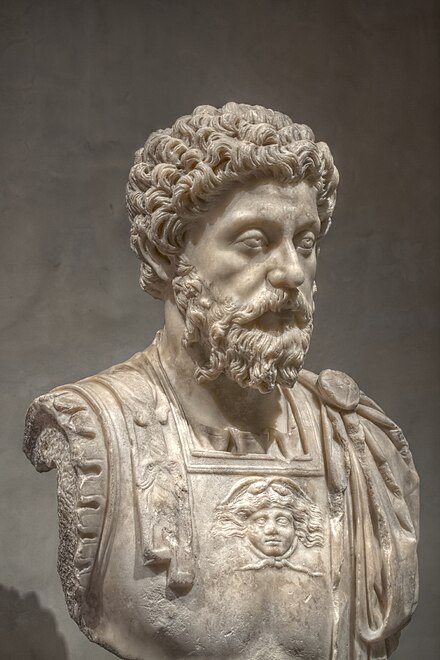
Marcus Aurelius (121–180 CE)
Life and Major Events:
Marcus Aurelius, the Roman emperor and Stoic philosopher, is often regarded as the most renowned of the Stoic thinkers. Born in Rome to a prominent family, he was groomed for leadership from a young age. His reign, which lasted from 161 to 180 CE, was fraught with challenges, including military conflicts on multiple fronts, the devastating Antonine Plague, and internal strife within the Roman Empire. Despite these pressures, Marcus Aurelius is celebrated for his commitment to Stoic philosophy, which he used as a guide to navigate the complexities of leadership and personal conduct.
His deep engagement with Stoicism is reflected in his character and decisions, as he sought to embody the principles of virtue, rationality, and resilience. Notably, Marcus served as a co-emperor alongside Lucius Verus for much of his reign, which was an unusual arrangement in Roman governance. His ability to maintain stability and order during turbulent times has earned him lasting respect as a wise and benevolent ruler.
Notable Writings:
Marcus Aurelius is best known for his seminal work:
- Meditations: This collection of personal reflections, written during his military campaigns, offers profound insights into his thoughts on Stoic philosophy, self-improvement, and the human condition. Unlike traditional philosophical texts, Meditations was never intended for publication; instead, it served as a private journal in which Marcus reflected on his experiences and sought to align his actions with Stoic ideals. The work emphasises the importance of inner strength, virtue, and the acceptance of life’s challenges, encouraging readers to focus on what they can control and to live in harmony with nature.
Meditations provides a unique glimpse into the mind of a philosopher-emperor, illustrating how Stoic principles can be applied in the face of adversity and moral dilemmas. Its themes of humility, duty, and the pursuit of wisdom resonate powerfully with readers even today.
Interesting Facts:
Marcus Aurelius was not only a philosopher but also an accomplished military leader, often leading his troops into battle himself. His reign saw him engaged in the Marcomannic Wars, where he defended the empire against invading tribes. His dedication to Stoicism extended beyond philosophy; he implemented policies aimed at the welfare of his people and sought to be a just ruler, embodying the Stoic ideal of service to others.
Remarkably, Meditations has been translated into numerous languages and remains a key text in both philosophical and self-help literature, influencing countless individuals seeking guidance on how to lead a virtuous life. Marcus’ reflections on mortality and the impermanence of life serve as timeless reminders of the Stoic belief in the importance of living fully in the present moment. His legacy as a philosopher-king endures, illustrating how one can integrate wisdom with the responsibilities of leadership.
Practicing Stoicism
To build tranquillity in your daily life, practice mindfulness of your thoughts and emotional responses. Each day, set aside time for reflection and meditation, asking yourself: “Am I reacting to this event, or am I responding with clarity and reason?” Focus on accepting life’s unpredictability, grounding yourself in the present, and letting go of judgments that lead to distress. These practices are cornerstones of the Stoic approach to inner peace.
Daily Stoic Habits
Whenever you feel your mind becoming unsettled, pause and remind yourself: “This too is beyond my control.” Shift your focus to the present and realign your thoughts with what you can influence.
What Can Stoicism Teach Me
Key Lessons from Stoicism
Stoicism teaches that tranquillity of mind is not something that comes from the absence of challenges, but from our ability to respond to them with wisdom and composure. By controlling our perceptions, staying grounded in the present, and accepting life’s uncertainties, we can cultivate a profound sense of inner peace.
01
Control
Inner tranquillity arises from focusing on what we can control.
02
Presence
Living fully in the present moment quiets the restless mind.
03
Acceptance
Embrace life’s events as they are to find lasting peace and tranquility of mind.
- STOIC THOUGHTS